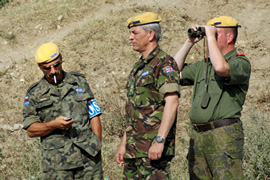
Moscow Ready to Scuttle U.N. and OSCE Missions in Georgia
Publication: Eurasia Daily Monitor Volume: 6 Issue: 113
By:

Russia is running the countdown to zero on the OSCE and U.N. observer missions in Georgia. The mandates of both are due to expire before the end of this month, their re-negotiation subject to a Russian veto. Moscow threatens to kill both missions imminently by vetoing their mandates, unless the two organizations accept the "independence" of Georgia’s Russian-occupied territories of South Ossetia and Abkhazia, respectively.
On June 11 Russian Minister of Foreign Affairs Sergei Lavrov reaffirmed the position that "the presence of U.N. and OSCE observers in Abkhazia and South Ossetia [is only possible on the basis of the new situation [whereby] South Ossetia and Abkhazia have become independent states." If the OSCE and U.N. accept those "realities," Lavrov told a news conference, then their mandates regarding South Ossetia and Abkhazia, respectively, can be agreed upon [i.e, Russia would not veto]. But, if the two organizations "stick to Georgia’s territorial integrity within its former borders, then they will get no results [on the mandates] (Interfax, June 11).
U.N. Secretary-General Ban Ki-moon has made significant concessions to Russia in his latest report on the United Nations Observer Mission in Georgia (UNOMIG). In recommending a renewal of UNOMIG’s mandate regarding Abkhazia through re-negotiation in the U.N. Security Council, Ban has adopted some terminology and semantics that cast implicit doubt on Georgia’s territorial integrity. Ban apparently yielded to Moscow’s threats to scuttle the Geneva consultations on Abkhazia and South Ossetia unless Ban revised some of the language of his report (EDM, June 2).
At the OSCE, however, the European Union collectively as well as the United States and other countries adhere more firmly to the principle of Georgia’s territorial integrity in the endgame negotiations on the OSCE’s field presence and its mandate. These countries support Georgia’s position that the OSCE Mission to Georgia should remain a single entity, covering (as it had prior to the August 2008 war) Georgia’s entire territory including South Ossetia, with unimpeded access for OSCE military monitors on the ground in the secessionist territory and for delivery of humanitarian assistance there.
The OSCE Mission to Georgia is sitting on its suitcases, however. Russia threatens to kill it within days by vetoing the mission’s mandate. Moscow wants to divide this OSCE Mission into two new entities: one mission to cover the Russian "recognized" South Ossetia and another mission to cover post-2008 Georgia within Russian-redrawn "borders." Russia insists, moreover, that the mandate and operating parameters of a "new" monitoring mission in South Ossetia be negotiated by the OSCE directly with the "independent" South Ossetian authorities.
By engineering two OSCE Missions out of the existing one, and forcing the new one to enter into an agreement with the Tskhinvali authorities, Moscow hopes to extract an implicit recognition or acceptance of South Ossetia’s secession from Georgia and of the new "border" between them.
As part of the same agenda, Russia wants the OSCE and U.N. to support the signing of some kind of agreements on non-use of force between Georgia and South Ossetia and between Georgia and Abkhazia. This is an updated version of Moscow’s pre-2008, long-standing goal to have such agreements signed by the Georgian government with the Tskhinvali and Sukhumi authorities, respectively. At that time, the signing of such treaties would implicitly have legitimized the two territories’ de facto secession from Georgia, even as Moscow was still adhering to Georgia’s territorial integrity on a purely theoretical level. At present, however, Moscow seeks to elicit legitimization of the two territories’ "independence" through the signing of such agreements.
Addressing a special session of the OSCE’s Permanent Council in Vienna, Russian State Secretary and Deputy Minister of Foreign Affairs Grigory Karasin declared that any OSCE effort to maintain a single OSCE field presence in Georgia "proceeds from the unreal premise of the territorial integrity of Georgia. A monitoring mission on South Ossetia’s territory would not be possible without the agreement of Tskhinval." Moreover, Russia wants "the states" Georgia and South Ossetia, as well as "the states" Georgia and Abkhazia, to maintain "normal political dialogue" and draft legally-binding agreements on the non-use of force as a corollary to the international monitoring, if the mandates are approved (OSCE Permanent Council documents, June 4).
The OSCE’s incumbent Greek Chairmanship has drawn up a proposal that would enable the OSCE’s field presence to continue while giving a minimum of satisfaction to Russian demands. The proposal goes half-way toward splitting the existing OSCE Mission while safeguarding Georgia’s legal title to sovereignty in the territory. It accepts an administrative boundary line but not a "border" between Georgia and South Ossetia. And it provides for unimpeded access to a small number of international monitors in the secessionist territory.
The E.U. collectively, as well as the United States and almost all other countries in the OSCE support the Greek Chairmanship’s proposal, Moscow, however, has vetoed (withheld consensus from) several versions of the compromise proposal, most recently on May 13. Karasin’s speech to the Permanent Council indicates that Russia will kill this OSCE presence if it cannot misuse for Moscow’s own purposes.




